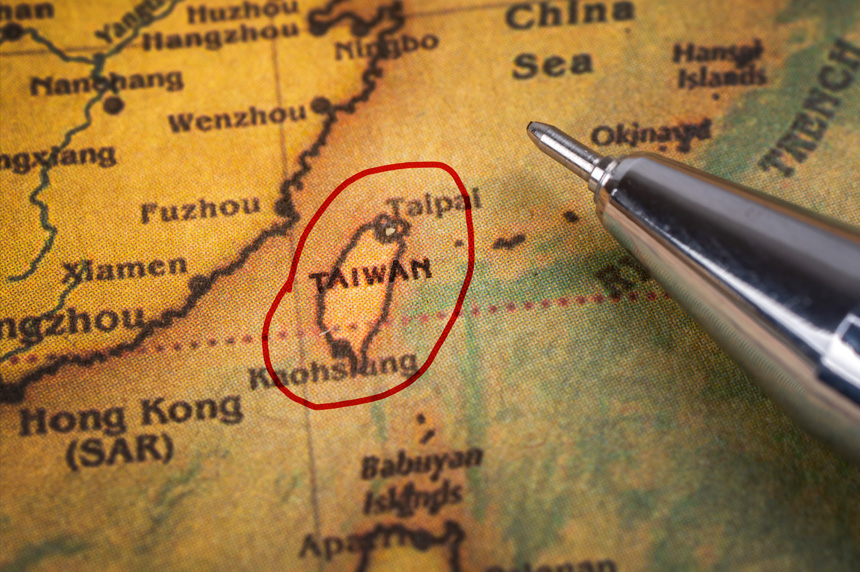Many analysts are warning China is gearing up to invade Taiwan. Could Russia be a predictor of their strategy?
The world has been watching the Russian invasion of Ukraine unfold, perhaps none more closely than Chinese President Xi Jinping. Open-source intelligence (OSINT) researchers have been taking note of China’s steady build up of weaponry. The intentions of China to reclaim some or all of the territory have been made increasingly public in recent years, and many diplomats and researchers consider a Chinese invasion of Taiwan likely to be imminent, if not within the next few years. Albeit, the attacks could take on a less traditional form, as China shows increasing interest in cyber warfare techniques.
While there is no one-to-one comparison between Ukraine and a potential Chinese invasion of Taiwan, what happens in Eastern Europe could influence the strategy of both the People’s Republic of China and the Taiwanese response. Cybersecurity will also likely play an outsized role in the outcome. Whether or not China will launch a full-scale invasion or continue engaging in cyber and information warfare, the People’s Republic is likely taking notes from the Kremlin’s attempt to recapture Ukraine. Here’s what they could be learning and how Taiwan may respond.
“There are a multitude of differences between Ukraine and Taiwan, including history and geography. But both embattled democracies sit next to much larger, nuclear-armed military powers ruled by authoritarian leaders who have made it clear that they do not see their neighbors as sovereign states. ”
— Marc Santora and Steven Erlanger, The New York Times
Indicators of a fragile peace
China has issued statements proposing the “reunification” with Taiwan, denying the state’s sovereignty and claiming it is a territory. (This claim has been flatly denied by Taiwan.) Since the statement, China has been carrying out military exercises near the island, including firing missiles into the strait which divides the two nations.
A full-scale military invasion is both financially and diplomatically expensive, as Putin has learned. Harsh sanctions in response to Russia’s invasion have had grave economic consequences for the country. Beijing would expect no less of a reaction if they were to invade Taiwan. The Center for Strategic & International Studies sounded the alarm that China may be shoring up its economy to prepare for isolation and sanctions. Trade policies that create global reliance on Chinese exports and eliminating their own foreign dependencies are just two of the ways China has created a plan for better self-sufficiency.
OSINT researchers have also taken note of a steady supply of new aircraft carriers, missiles and other military supplies, many of which were first spotted using geospatial satellite imagery. The stockpiling of weapons could be a defensive measure or attempt to assert itself as a global power, but the growing arsenal has given Taiwan reason to worry.
Waging war over the web
Before Russia’s invasion of Ukraine, it had deployed strategic disinformation techniques to foster a sense of Soviet nostalgia among Ukrainians who consider themselves Russian. From falsely accusing the Ukrainian government of being run by nazis to contributing funds to erect statues of Soviet leaders, the Kremlin had sought to dissipate resistance for an eventual invasion.
China has so far mirrored the Russian rhetoric when discussing Taiwan, such as in proposing a “peaceful reunification.” (Taiwan says it has never been ruled by China.) The language of unity is meant to be a more palatable alternative to forcibly invading a sovereign nation for citizens and foreign witnesses alike.
China has long been fascinated by Russia’s cyberattacks on Ukraine, as noted by Recorded Future. In their report, they cite documents on the 2015 attack on Ukraine’s power grid obtained by China’s state-owned enterprises, as well as the People’s Liberation Army (PLA), which were used to shore up China’s grid weaknesses and plan their own potential offensive strategies. Ukraine’s ability to stay online and contradict Russia’s narrative of the invasion via Starlink has been pivotal to their defensive strategies, something China is likely noting.
“Cybersecurity experts and China observers who spoke to CyberScoop strongly believe that Beijing’s military leaders are learning from Russia’s approach to cyberspace — missteps and all — during the Ukraine conflict.”
— Tim Starks and AJ Vicens, CyberScoop
The economic fallout of a potential war in the South China Sea
As researchers and analysts prepare for and predict a possible war, economists warn the impact of a conflict between China and Taiwan would be globally devastating. Economists say current models for predicting economic forecasts aren’t equipped to handle large-scale catastrophic events. Their toolkits largely depend on standard deviations, making a prediction for major global events like war, pandemics or food shortages outside the model’s purview.
Despite unreliable predictions, however, an invasion of Taiwan would have consequences for container shipments in the Taiwan Strait and nearby waters, a crucial international trade route. Taiwan is also an important country in the digital supply chain and attacks on their digital infrastructure would similarly have impacts worldwide.
Beyond the economy, human rights organizations are also expressing concern as China heightens its rhetoric toward Taiwan. The country’s treatment of Uyghur populations, an ethnic minority in China, has garnered global condemnation. Estimates by human rights groups say more than one million Uyghurs have been detained in “re-education camps” against their will. A recent report also found apps used by Uyghurs to be targeted by spyware. This treatment is foreboding for Taiwanese people if their country were to be captured by authoritarian rule. U.S. agencies warn they could face similar treatment in that scenario.
China isn’t the only observer
While it’s clear that China is taking notes from both Russia’s successes and blunders in Ukraine, they aren’t the only ones. Taiwan has been steadily building its defenses against a possible attack. Taiwan President Tsai Ing-wen warned China to “think twice” about an invasion. A Taiwanese tech tycoon has launched a program to prepare over 3 million citizens with cyber defense training. People in Taiwan are also studying Ukrainian defensive tactics against Russia.
Taiwan will need to bolster their military, training and defenses to pull off a resistance as well as Ukraine, but their citizens have cited the Ukrainian resilience as an inspiration.
Every other week, we report the most important OSINT news stories that researchers should know about.


